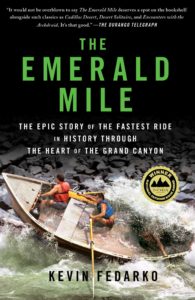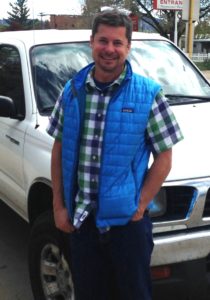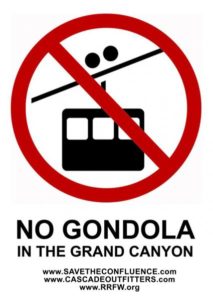We spoke recently with Kevin Fedarko, author of The Emerald Mile: The Epic Story of the Fastest Ride in History Through the Heart of the Grand Canyon.
Fedarko, a former senior editor of Outside magazine, spoke at the Cortez Public Library as part of the Amazing Author series.
We met over lunch, before he headed off to another speaking engagement in Telluride.

ColoradoOutsider: Wilderness and being outside are your topics. You’re recording, experiencing, and trying to be mindful. How does that work for you? Like on this recent trek, walking the Grand Canyon (on assignment for National Geographic), were you “on” all the time?
Kevin Fedarko: In that context, I’m always on. I’m very cognizant of the fact that everything that happens is grist for the mill. I think it’s really essential to record as much as possible, in situ, to get it down in the moment.
That’s a huge challenge during a trip like that because I’m always so exhausted. You can’t take notes while you’re walking. It’s just impossible. And I was so exhausted in camp at night that all I wanted to do was go to sleep. So I carry a tape recorder right on my backpack, on a strap. I found it was amazingly efficient.
Pete (photographer and videographer Pete McBride} was constantly recording as well. Much as I’d love to be in Zen poet mode or whatever, and not worry about being a journalist, this is my material, what’s happening. Also, to get down thoughts is really important even if it’s in a really rough moment.
COO: My kids and I have an ongoing argument on whether taking pictures takes away from the moment or adds to the moment, adds to one’s ability to be in the moment. When you’re on assignment, does that make your recall and memories sharper? Or does it put blinders on, because you might not recall what you didn’t record?
KF: For me it does make them sharper because I’m forced into a level of engagement that goes beyond having fun or registering its beauty and then moving on. When you’re forced to record, you’re forced to articulate your thoughts. That pulls you in. Some might say it’s a false engagement because it’s an intellectual engagement. I’m sure you could go down that road and have a long PhD thesis on that. But for me, it does heighten the experience. It imbues it with a coherence and meaning that wouldn’t be there otherwise.

Kevin Fedarko pauses before heading to Telluride
It’s also less enjoyable. I can’t coast through it. Even when I’m trying to do that, I’m often pulled back in by some sort of insight or observation. My tape recordings may be just five seconds long or so. They are just impressions.
COO: Key words or snapshots?
KF: Absolutely. For instance, the way the pebbles at the bottom of a slot canyon are all different colors because the floor of a slot canyon collects all the different layers of rock and they are literally all jumbled together. Each represents a different place in time. Some are 2.5 million years old and some are 1.7 billion years old. So you have time jumbled together in rock, represented in color. That would be an example of an impression.
COO: But you don’t have time to fine-tune it as a wordsmith. You table that bit.
KF: Right. It seems to me it’s most important to record it. I can then think about the words later.
Read Part II, in which Fedarko discusses the specter of Grand Canyon development.
